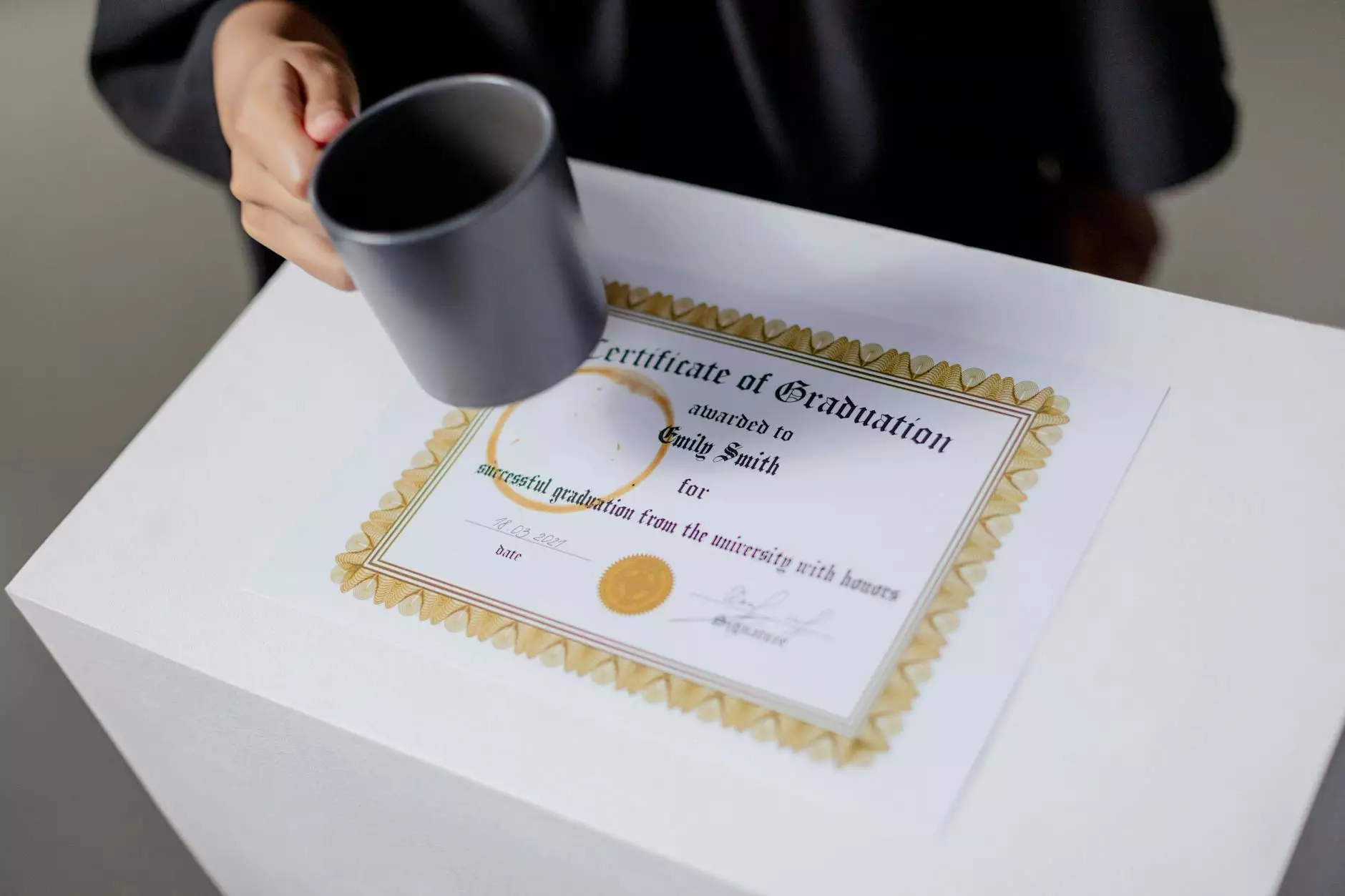The Truth Behind Real Fake Certificates: A Comprehensive Guide

In the ever-evolving landscape of education and professional services, the demand for real fake certificates has surged. As individuals seek to enhance their qualifications and stand out in a competitive market, understanding the implications, benefits, and ethical considerations surrounding fake certificates becomes paramount. This article delves deep into the world of real fake certificates, aiming to provide valuable insights and guidance for those contemplating their use.
Understanding Real Fake Certificates
At its core, a real fake certificate is an officially styled document that resembles genuine credentials but is actually fabricated. These certificates can represent educational achievements, professional skills, or various other qualifications. While the term may imply deceit, the motivations behind acquiring such certificates can vary widely, from personal ambition to practical necessity.
The Purpose Behind Obtaining Real Fake Certificates
There are several reasons why individuals might seek out real fake certificates:
- Career Advancement: In competitive job markets, candidates feel pressured to present qualifications that enhance their employability.
- Meeting Job Requirements: Some job postings stipulate certain educational qualifications that candidates may not possess.
- Self-esteem Boost: For some individuals, possessing a degree or certification can bolster confidence and provide motivation to pursue further education.
- Quick Resumes: Many professionals feel the need to rapidly enhance their resumes to align with potential job opportunities.
The Legal and Ethical Landscape
The world of real fake certificates is riddled with ethical and legal complexities. While creating or using fake certificates can be beneficial in some scenarios, it can also lead to severe consequences. Understanding these aspects is crucial for anyone considering this option.
Legal Considerations
It is essential to recognize that the use of fake certificates can lead to legal repercussions, depending on the jurisdiction. Here are some key legal points to consider:
- Fraud Charges: Presenting a fake certificate as genuine can result in fraud allegations, which can carry heavy legal penalties.
- Employment Termination: If an employer discovers that an employee presented false qualifications, it may lead to immediate termination.
- Insider Threats: Companies that issue credentials may take severe action against those who misuse their certificates.
Ethical Implications
Beyond legality, the ethical implications of using real fake certificates deserve consideration. Engaging in dishonesty can fundamentally damage one’s professional integrity and reputation. Most professionals strive for authenticity, and the repercussions of dishonesty can have long-lasting effects on career trajectories.
Types of Real Fake Certificates Available
Individuals seeking real fake certificates can choose from various types, depending on their needs and goals:
1. Educational Certificates
These certificates mimic diplomas or degrees from various institutions. They can indicate completion of high school, college degrees, or specialized training courses.
2. Professional Certifications
These documents represent a professional skill set, often required in fields like IT, healthcare, and project management. Examples include Cisco certifications, CompTIA, and Six Sigma.
3. Training Completion Certificates
Certificates that indicate completion of workshops, seminars, or online courses can provide a quick way to showcase one’s commitment to professional development.
The Benefits of Real Fake Certificates
While using real fake certificates has its risks, there are also several potential benefits that individuals can gain:
1. Enhanced Career Opportunities
By presenting additional qualifications, individuals can increase their chances of landing desired positions. These certificates can open doors that may have been previously closed due to a lack of formal education or credentials.
2. Improved Self-esteem
Possessing a certificate can boost an individual’s confidence, encouraging them to pursue further education or career advancements. This newfound confidence can be the motivation needed to excel in their professional life.
3. Flexibility in Employment
In industries that value certifications, having a range of qualifications can make a candidate more versatile and adaptable, increasing job security and growth potential.
Choosing the Right Provider for Real Fake Certificates
For those considering obtaining real fake certificates, selecting a reputable provider is crucial. Here are some tips to guide your choice:
- Research the Provider: Look for reviews, testimonials, and ratings. A credible provider should have a strong online presence and positive feedback from past customers.
- Quality of Certificates: Ensure that the documents look professional and closely resemble genuine certificates from recognized institutions.
- Customer Support: A reliable provider should offer strong customer support, helping you through the purchasing process and addressing any concerns.
- Customization Options: The best services can customize certificates to meet specific needs, ensuring they align with the qualifications they represent.
How to Use Real Fake Certificates Responsibly
For individuals who choose to use real fake certificates, here are some pointers for doing so responsibly:
1. Be Aware of the Stakes
Understand the potential consequences of using a fake certificate. Consider the legal ramifications and the impact on your reputation. Make informed decisions.
2. Limit Usage
Using a fake certificate should be a last resort. Obtain genuine qualifications whenever possible and only use fake certificates as a temporary measure while pursuing legitimate education.
3. Maintain Professional Integrity
Above all, strive to maintain your professional integrity. Use fake certificates cautiously, and avoid relying on them as a long-term solution to educational or professional gaps.
The Future of Real Fake Certificates in Professional Growth
As the landscape of employment and education continues to evolve, it is likely that the conversation around real fake certificates will grow. The rise of online learning and the increasing emphasis on skills rather than formal education may lead to more acceptance of alternative qualifications. However, the ethical and legal aspects will always remain critical discussions that need to be actively addressed.
Final Thoughts: Embracing Authenticity in Our Pursuits
While real fake certificates can provide temporary relief and solutions for individuals seeking advancement, the ultimate goal should always be to pursue genuine education and authentic experiences. The world is shifting towards valuing skills and real-world experience over simply holding a piece of paper. Embracing this change and prioritizing authenticity will not only enhance individual credibility but will also contribute to a more honest and transparent professional environment.
Conclusion
In conclusion, the discussion around real fake certificates is multifaceted, encompassing legal, ethical, and personal implications. While there are benefits to obtaining fake certificates, it is vital to approach this avenue with caution and a strong understanding of one's professional integrity. The ultimate goal in any career should always be genuine growth and the pursuit of knowledge in our chosen fields.









